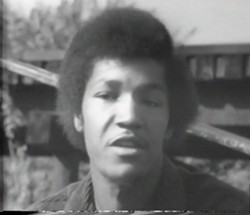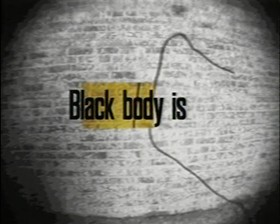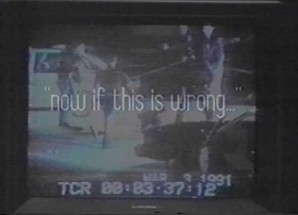The film is black and white, as was the issue. The camera do the job is a minimal jittery, as was the situations. A black guy – he appears to be in his mid-20s – is talking about the romance between the law enforcement and Black youth.
“They acquired inner thoughts, we acquired inner thoughts, they ought to think about that. I mean, if you get clubbed upside the head, guy, it hurts. They ought to know that, if they get clubbed upside the head, that is gonna harm. You know what I mean?”
The conversation is from 1972, one particular instant in a 31½-minute assortment of interviews named “Police Brutality.” Cable access Television set before we realized of cable access Television set. Amateurs earning movies, documenting heritage.
“That was Moveable Channel,” says Tara Merenda Nelson, curator of Transferring Graphic Collections at Visual Experiments Workshop. “The bottom, kind of the core ethos, was that they were going to enable men and women discover how to make their very own media and signify them selves and then find strategies to share their stories publicly.”
“Police Brutality” will be highlighted Thursday, July 30, on the garden at Visual Experiments Workshop. The screening will be highlighted in a system named “The Ability of Protest: Poetry & Film” which opens at seven:30 p.m. with performances by 4 poets — Sarah Adams, Sabine Bradley, Reenah Golden, and Rashaad Parker — followed by a collection of brief movies on race, some with disturbingly violent imagery. The familiar social-distancing protocols will be noticed: seating, 6 toes apart hand sanitizers delivered deal with coverings needed. Donations ($seven to $ten, recommended) will be recognized, on web page and on-line, on behalf of Black Lives Subject.
“Police Brutality,” and the stories it tells, would be a missing film if it weren’t for Visual Experiments Workshop (VSW), a gothic-wanting nonprofit at 31 Prince Avenue, on College Avenue, throughout from the Memorial Artwork Gallery. Launched in 1969, VSW provides support, investigate, film preservation, and instruction for men and women who see guides and visuals with a decidedly social-minded agenda. As the establishment proclaims on its internet web page, VSW is a spot where by creative men and women can make do the job that is “not what was dictated to them by the industrial pressures of publishers, galleries, and museums.”
So Visual Experiments Workshop is a repository for film and online video that have been accumulating dust at local colleges and the Rochester Public Library around the yrs. But it was also a motion, by means of independent-minded filmmakers such as George Stoney and Bonnie Sherr Klein.
“George Stoney is acknowledged as the godfather of neighborhood access tv simply because he was a filmmaker, but also considered strongly in this kind of amateurism,” Nelson says. “So, permitting men and women who were untrained to use applications of output to develop their very own media to convey to their very own stories.”
Stoney was a professor at Stanford, and Klein was one particular of his pupils. As Vietnam War resisters, she and her partner fled to Canada in 1967, but a few yrs later on moved to Rochester, where by she started Moveable Channel, concentrating on feminist themes. Following she suffered a stroke, Klein started earning movies on disability as well.
Visual Experiments Workshop has 910 videotapes created by Moveable Channel. 50 % of them were made for WXXI-TV’s “Homemade Television set,” which ran from 1972 to 1975. VSW has been awarded a handful of grants to maintain these tapes, most not long ago a Recordings at Chance grant this spring from the Council on Library and Details Assets.
Moveable Channel is a precious window into a time that predates even “America’s Funniest Residence Video clips.”
“Amateur online video was relatively unwieldy,” Nelson says. “You desired a lot of machines and there weren’t screenings, so you possibly created movies by means of output providers or huge output properties or tv studios.”
Alongside with earning her feminist movies and her collection on activist Saul Alinsky’s attempts to get a contract for hanging Black personnel at Kodak, Klein and other individuals connected with Visual Experiments Workshop were stockpiling a pool of online video machines for use by men and women in reduced-cash flow neighborhoods. What nowadays we would connect with “under-represented communities.” Also earning use of the machines was a team that grew out of Moveable Channel contacting them selves the Women’s Video Workshop.
Several of these movies are a mystery. Who are the men and women telling these stories? “We do not have a lot of documents, we only know what we see,” Nelson says.
Just one of these mysteries, “B’ism Allah,” by Moveable Channel and the Women’s Video Workshop, will be proven at “The Ability of Protest: Poetry & Film.” The film was created by Black young children from Rochester, ages ten to 14, Nelson guesses. She describes it as “poetry, but they’re also performing.”
Only not long ago was some gentle lose on this unknown team. “We were showing this piece, a couple of other screenings,” Nelson says, “and at last somebody reported, ‘Oh, I know who those people are, those people are The Black Seeds.’”
So not only does Visual Experiments Workshop enlighten the neighborhood, but the enlightenment goes in the other direction as well.
“Community crowdsourcing is a huge portion of our form of mission,” Nelson says. “Looking ahead with the Moveable Channel assortment, we want to set this into the neighborhood so that they can convey to us about the assortment, so that we can get it ideal and correctly catalog the meta-knowledge, and share the do the job.”
But why carry out anything like “Police Brutality” now, a fifty percent-century immediately after the truth? Why not permit the wounds recover?
For the reason that “Police Brutality,” Nelson says, is “shockingly prescient.” Moveable Channel made it for what she calls the 1972 model of a Law enforcement Accountability Board, The People’s Protection Committee for Interior City Law enforcement Coalition.
“They were a team of combined race,” she says, “so black men and women and white Rochester citizens that were coming with each other to elevate recognition around law enforcement brutality in Rochester, and to get some laws that would make it possible for for them to be read or protect them selves.”
Moveable Channel is local heritage. And national travesties that coincided with the instant, which include most likely the most-notorious jail riot in American heritage.
“There’s a lot of content material about Attica, it is astounding what we’ve acquired that is unique, Attica-related content material,” Nelson says.
There is a quotation that seems in a lot of sorts around the yrs: “Those who cannot try to remember the earlier are condemned to repeat it.” A couple of the movies being proven Thursday mirror on the beating of Rodney King in 1991, placing off the Los Angeles riots in 1992. We have been dwelling that soreness again this summer time, with the murder of George Floyd.
“Police brutality was a really critical issue in the neighborhood then, and stays so,” Nelson says. “It’s form of uncanny how it mirrors our recent instant.”
Jeff Spevak is WXXI’s arts and life editor and reporter. He can be arrived at at [email protected].



